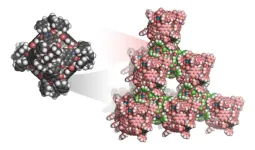(Press-News.org) People with cardiometabolic disorders—such as obesity, diabetes and heart disease—could increase their chances of living longer by adopting a healthy plant-based diet, according to a study being presented at the American College of Cardiology’s Annual Scientific Session (ACC.25).
While previous studies have assessed the benefits of plant-based diets in a general population, this new study is the first to focus on their benefits in people with cardiometabolic disorders, which are rising in prevalence worldwide and bring an increased risk of premature death.
“Among populations with cardiometabolic disorders, higher adherence to a healthful plant-based diet was significantly associated with a lower risk of total, cardiovascular and cancer mortality,” said Zhangling Chen, MD, PhD, of the Department of Cardiovascular Medicine at the Second Xiangya Hospital of Central South University in Changsha, China, and the study’s lead author. “More intake of healthy plant-based foods, less intake of unhealthy plant-based foods and less intake of animal-based foods are all important.”
Cardiometabolic disorders stem from a variety of genetic, environmental and lifestyle factors and affect the health of the cardiovascular system and how the body processes food. While some medications can help manage these disorders, diet and other lifestyle factors are key in preventing the progression to serious forms of heart disease and cancer that are associated with cardiometabolic disorders.
Researchers analyzed data from nearly 78,000 people with cardiometabolic disorders who participated in large prospective studies in the United Kingdom, United States and China. The pooled datasets included 55,000 adults from the U.K. Biobank (UKB) between 2006-2022, 18,000 U.S. adults from the National Health and Nutrition Examination Study (NHANES) between 1999-2018 and almost 4,500 Chinese adults from the Chinese Longitudinal Healthy Longevity Study (CLHLS) between 2006-2018.
Based on their responses to 24-hour dietary recall interviews or dietary questionnaires at baseline, researchers assigned each participant a score on two indexes. People who reported a diet high in healthy plant-based foods such as vegetables, fruits, whole grains, legumes, tea and coffee scored higher on the healthful plant-based diet index, while those who reported a diet higher in refined grains, potatoes, sugar-sweetened beverages and animal-based foods scored higher on the unhealthful.
Overall, closer adherence to a healthful plant-based diet was associated with a 17% to 24% lower risk of death from any cause, cardiovascular disease or cancer, while closer adherence to an unhealthful plant-based diet brought a 28% to 36% increased risk of death from any cause, cardiovascular disease or cancer.
For the analysis, researchers adjusted for confounding factors such as demographics, dietary and lifestyle factors. Results were consistent across subgroups by age, race, sex, smoking, alcohol intake, body mass index and physical activity. They were also consistent in people with different types of cardiometabolic disorders and in people from the U.K., U.S. and Chinese cohorts when these groups were analyzed separately, even though the U.K. and U.S. groups were significantly younger, with an average age of 57 years and 59 years, respectively, compared with the Chinese group, which had an average age of 84 years.
In a separate study that only used NHANES data and did not focus on people with cardiometabolic disorders, the same research group found that a greater adherence to a healthy beverage pattern was associated with a lower risk of premature death. They defined a healthy beverage pattern as one high in tea, coffee and low-fat milk and low in alcohol, whole-fat milk, fruit juice and sugar-sweetened and artificially sweetened beverages.
“These findings may help individuals with cardiometabolic disorders make heathier lifestyle choices,” Chen said. “It is important to identify and develop cost-effective strategies to promote health among individuals with cardiometabolic disorders.”
For both studies, the researchers said that dietary data were self-reported by study participants at baseline and not assessed again, so the studies were not able to reflect any dietary changes participants may have made. They added that some potentially confounding factors were difficult to eliminate and suggested that additional prospective studies in diverse global populations would help to strengthen the evidence and confirm the importance of healthy food and beverage consumption patterns in broader populations.
Chen will present the studies, “Associations Between Plant-Based Diets and Total Mortality Among Participants with Cardiometabolic Disorders” and “Associations of a Healthy Beverage Score with All-Cause and Cause-Specific Mortality among U.S. Adults: A Nationwide Cohort Study,” on Saturday, March 29, 2025, at 3:30 p.m. CT / 20:30 UTC in South Hall.
ACC.25 will take place March 29-31, 2025, in Chicago, bringing together cardiologists and cardiovascular specialists from around the world to share the newest discoveries in treatment and prevention. Follow @ACCinTouch, @ACCMediaCenter and #ACC25 for the latest news from the meeting.
The American College of Cardiology (ACC) is the global leader in transforming cardiovascular care and improving heart health for all. As the preeminent source of professional medical education for the entire cardiovascular care team since 1949, ACC credentials cardiovascular professionals in over 140 countries who meet stringent qualifications and leads in the formation of health policy, standards and guidelines. Through its world-renowned family of JACC Journals, NCDR registries, ACC Accreditation Services, global network of Member Sections, CardioSmart patient resources and more, the College is committed to ensuring a world where science, knowledge and innovation optimize patient care and outcomes. Learn more at ACC.org.
###
END
Marijuana is now legal in many places, but is it safe? Two new studies add to mounting evidence that people who use cannabis are more likely to suffer a heart attack than people who do not use the drug, even among younger and otherwise healthy adults. The findings are from a retrospective study of over 4.6 million people published in JACC Advances and a meta-analysis of 12 previously published studies being presented at the American College of Cardiology’s Annual Scientific Session (ACC.25).
Marijuana use has risen in the United States, especially in states where it is legal to buy, sell and ...
Lifestyle and health factors that are linked with heart disease appear to have a greater impact on cardiovascular risk in women than men, according to a study being presented at the American College of Cardiology’s Annual Scientific Session (ACC.25).
While factors such as diet, exercise, smoking and blood pressure have long been linked with heart disease risk, the new study is the first to show that these associations are collectively stronger in women than men. According to the researchers, the ...
Enzymes found in landfills around the world may be able to break down plastic waste. Some 11 billion metric tons of plastic are projected to accumulate in the environment by 2050. Enzymatic and microbial degradation is a promising method of plastic recycling. Landfills, environments where plastics are an abundant resource, are crucibles of bacterial evolution. Liyan Song and colleagues collected plastic biocatalytic enzymes from landfills around the world, using metagenomics and machine learning. Samples came from China, Italy, Canada, Great Britain, Jamaica, and India and included refuse, leachate, sludge, and airborne particles. The authors identified 31,989 possible ...
PULLMAN, Wash. — For years, therapy dogs have ruled the world of animal-assisted services (AAS), offering stress relief to college students, hospital patients, and those in need of emotional support. But new research suggests that some cats might also have what it takes to join the ranks of therapy animals—bringing their purrs, gentle headbutts, and calm demeanor to the field.
A study in the journal Animals co-authored by Washington State University professor Patricia Pendry, in collaboration with researchers in Belgium, found that therapy cats share specific behavioral traits that may make them well-suited for AAS programs. The research team surveyed ...
Creamy, crumbly, mild, or sharp — cheese is a true crowd-pleaser. From everyday meals to gourmet delights, it’s a staple across the Western world. In 2023, the average European enjoyed 20.5 kilograms of cheese.
But it is no secret that, as a dairy product, heavy cheese consumption comes with a significant environmental impact. As such, extensive research is being conducted on how to produce plant-based cheeses. Unfortunately, finding an entirely plant-based cheese that satisfies cheese lovers in terms of both texture and taste has been difficult. And texture in particular has been challenging to get just right.
So, food researchers at the University ...
Mill Valley, CA – March 18, 2025 – The SynGAP Research Fund (SRF) dba Cure SYNGAP1, a 501(c)(3) nonprofit organization, has awarded a $65,000 grant to Dr. Julia Dallman, Associate Professor of Biology at the University of Miami College of Arts and Sciences, to investigate gastrointestinal (GI) symptoms in SYNGAP1-related disorders (SRD) patients. Leveraging her extensive experience with zebrafish models, Dr. Dallman's research aims to identify therapies that alleviate severe GI issues, such as chronic ...
Unsubstituted π-electronic systems with expanded π-planes are highly desirable for improving charge-carrier transport in organic semiconductors. However, their poor solubility and high crystallinity pose major challenges in processing and assembly, despite their favourable electronic properties. The strategic arrangement of these molecular structures is crucial for achieving high-performance organic semiconductive materials.
In a significant breakthrough, a research team led by Professor Hiromitsu Maeda from Ritsumeikan University, including Associate Professor Yohei Haketa from ...
Researchers from Kyoto University have achieved a groundbreaking advancement in materials science by developing the world's first three-dimensional van der Waals open frameworks (WaaFs). This innovation challenges the conventional belief that van der Waals interactions are too weak for open framework materials, demonstrating their potential for stable and highly porous materials.
Published in Nature Chemistry, the study presents a strategy using octahedral metal-organic polyhedra (MOPs) as building blocks to construct WaaFs. These frameworks exhibit high thermal stability, exceptional porosity, and reversible assembly, opening new avenues for applications in gas storage, separation, ...
Global population datasets, crucial for decision-making by governments and institutions, may underestimate rural populations by as much as 53% to 84%, reveals an Aalto University study.
Governments, international bodies and researchers rely on global population data for resource allocation and infrastructure planning to disease epidemiology and disaster risk management. In a new study published in Nature Communications, researchers from Aalto University in Finland show the profound and systematic extent to which these datasets underestimate ...
Modern humans descended from not one, but at least two ancestral populations that drifted apart and later reconnected, long before modern humans spread across the globe.
Using advanced analysis based on full genome sequences, researchers from the University of Cambridge have found evidence that modern humans are the result of a genetic mixing event between two ancient populations that diverged around 1.5 million years ago. About 300,000 years ago, these groups came back together, with one group contributing 80% of the genetic makeup of modern humans and the other contributing 20%.
For the last two decades, the prevailing view in human evolutionary genetics has been that Homo sapiens first ...




